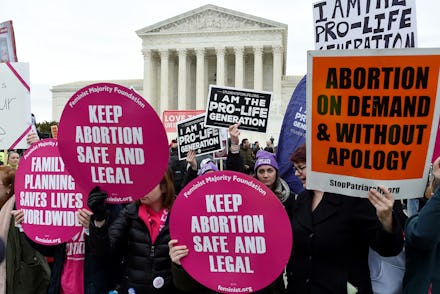The Supreme Court just struck down a major threat to abortion access

The Supreme Court on Monday ruled that a Louisiana law demanding that abortion providers have admitting privileges to a nearby hospital is unconstitutional, effectively preserving abortion access in the state. Requiring admitting privileges slashes access to the procedure because it is costly and time-consuming, and clinics may either shutter or not offer abortion care as a result. There is additionally no medical reason to require hospital privileges, as abortion is by and large a very safe medical procedure.
The ruling Monday was somewhat of a surprise for the conservative-leaning court, which issued decisions earlier this month on LGBTQ worker rights and protections for young immigrants that also were in line with liberal priorities. The justices were split 5-4 on the Louisiana decision, with Chief Justice John Roberts joining the bench's liberals in striking down the restrictive law.
The case, known as June Medical Services v. Russo, was a near carbon-copy of an earlier case the high court had already ruled on out of Texas. In that case, Whole Woman's Health v. Hellerstedt, the court ruled in 2016 that a Texas law requiring abortion providers to have admitting privileges at a nearby hospital was an unconstitutional restriction on a person's right to an abortion, as established by Roe v. Wade.
The Supreme Court is generally bound to precedent, which is why its individual rulings are so important. If the court has already ruled one way on a specific issue or the legality of a particular strategy, it is generally expected to rule the same way should the same issue come before the justices again. But June Medical Services was the first abortion-related case to come before the Supreme Court since President Trump appointed two new conservative justices — particularly since Justice Brett Kavanaugh replaced Justice Anthony Kennedy, who retired as the bench's swing vote. Trump had promised to appoint anti-abortion justices who would overturn Roe.
Instead, it was Roberts who delivered the win for liberals, though he made it clear that his decision was based entirely on precedent, not his personal opinion of whether the Louisiana law was sound. He specifically cited the principle of stare decisis — in effect, deciding legality by precedent — and said that while he voted in 2016 to uphold Texas's law, he switched his position now on the near-identical Louisiana law to respect the precedent set by the Whole Woman's Health decision.
Justice Stephen Breyer wrote the decision for the liberal plurality, with Roberts filing his concurring opinion (in essence, a separate document because while he voted to strike down the Louisiana law, he did so by different reasoning than the other four justices). The case was expected to be the most major threat to Roe and the constitutional right to an abortion, given the makeup of the court, and the decision to protect reproductive care was hailed by the ACLU, Planned Parenthood, and other advocacy organizations.